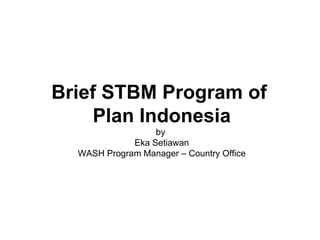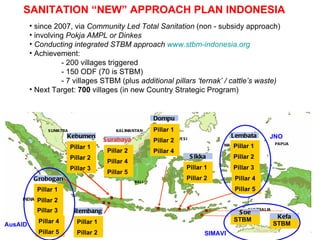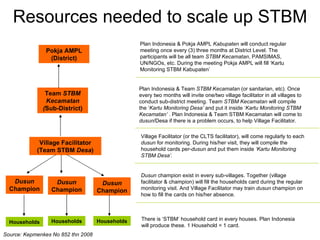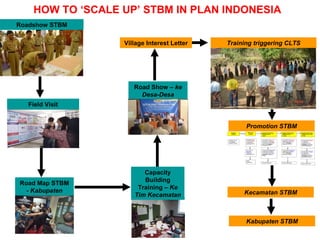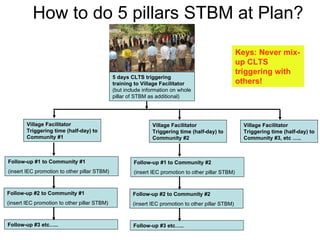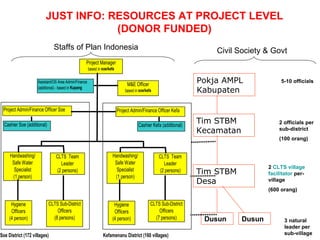Stbm di plan indonesia maret 2012
- 1. Brief STBM Program of Plan Indonesia by Eka Setiawan WASH Program Manager ŌĆō Country Office
- 2. THE ŌĆ£OLDŌĆØ SANITATION APPROACH PLAN INDONESIA ŌĆó Plan stay between 10-17 years in 1 (one) District), since 1969 ŌĆó Since 2003, via Total Sanitation (subsidy approach) ŌĆó Not involving Pokja AMPL ŌĆó Spent up to 1,5 mill USD for 15,000 toilets construction benefitted to 45,000 people. However there are still 100,000 people who do not have access to toilets in the other 90 PlanŌĆÖs village ŌĆó The ŌĆ£oldŌĆØ result: No ownership. Abandoned facilities No behavior change
- 3. SANITATION ŌĆ£NEWŌĆØ APPROACH PLAN INDONESIA ŌĆó since 2007, via Community Led Total Sanitation (non - subsidy approach) ŌĆó involving Pokja AMPL or Dinkes ŌĆó Conducting integrated STBM approach www.stbm-indonesia.org ŌĆó Achievement: - 200 villages triggered - 150 ODF (70 is STBM) - 7 villages STBM (plus additional pillars ŌĆśternakŌĆÖ / cattleŌĆÖs waste) ŌĆó Next Target: 700 villages (in new Country Strategic Program) Dompu S UMA TRA KA L IMA NTA N Pillar 1 Kebumen Lembata JNO S urabaya PillarULA WE S I S 2 PA PUA Pillar 1 Pillar MA LUKU 1 Pillar 2 Pillar 4 Pillar 2 S ikka Pillar 2 Pillar 4 Pillar 3 Pillar 1 Pillar 3 Pillar 5 G robogan BALI Pillar 2 Pillar 4 Pillar 1 Pillar 5 INDIA N OC E A N Pillar 2 Pillar 3 Rembang S oe A US TRA LIA STBM Kefa Pillar 4 Pillar 1 STBM AusAID Pillar 5 Pillar 2 SIMAVI
- 4. Resources needed to scale up STBM Plan Indonesia & Pokja AMPL Kabupaten will conduct regular Pokja AMPL meeting once every (3) three months at District Level. The (District) participants will be all team STBM Kecamatan, PAMSIMAS, UN/NGOs, etc. During the meeting Pokja AMPL will fill ŌĆśKartu Monitoring STBM KabupatenŌĆÖ Plan Indonesia & Team STBM Kecamatan (or sanitarian, etc). Once Team STBM every two months will invite one/two village facilitator in all villages to Kecamatan conduct sub-district meeting. Team STBM Kecamatan will compile (Sub-District) the ŌĆśKartu Monitoring DesaŌĆÖ and put it inside ŌĆśKartu Monitoring STBM KecamatanŌĆÖ . Plan Indonesia & Team STBM Kecamatan will come to dusun/Desa if there is a problem occurs, to help Village Facilitator. Village Facilitator (or the CLTS facilitator), will come regularly to each Village Facilitator dusun for monitoring. During his/her visit, they will compile the (Team STBM Desa) household cards per-dusun and put them inside ŌĆśKartu Monitoring STBM DesaŌĆÖ. Dusun champion exist in every sub-villages. Together (village Dusun Dusun Dusun facilitator & champion) will fill the households card during the regular Champion Champion monitoring visit. And Village Facilitator may train dusun champion on Champion how to fill the cards on his/her absence. Households Households There is ŌĆśSTBMŌĆÖ household card in every houses. Plan Indonesia Households will produce these. 1 Household = 1 card. Source: Kepmenkes No 852 thn 2008
- 5. HOW TO ŌĆśSCALE UPŌĆÖ STBM IN PLAN INDONESIA Roadshow STBM Village Interest Letter Training triggering CLTS Road Show ŌĆō ke Desa-Desa Field Visit Promotion STBM Pelatihan Pemicuan Kegiatan Monitoring / Kegiatan Monitoring/ Kegiatan Monitoring (5 hari) (2 Jam) Assistance ke-1 Assistance ke-2 /Assitance ke-3, dstŌĆ” (1 jam) (1 Jam) (1 Jam) Fasilitator Desa FD kembali ke Dusun A, FD kembali ke Dusun A Pelatihan CLTS FD kembali ke Dusun turun ke Dusun atau ke KK, melakukan melakukan monitoring ke Fasilitator A melakukan A melakukan monitoring CLTS setelah CLTS, sekaligus Desa/FD (5 hari) monitoring CLTS, pemicuan CLTS pemicuan sekaligus kampanye PAM RT sekaligus kampanye Kampanye CTPS.. Pilar STBM lainnyaŌĆ” FD Turun ke FD Kembali ke Dusun B, FD kembali ke Dusun B Dusun B melakukan monitoring melakukan monitoring FD kembali ke Dusun melakukan CLTS setelah pemicuan CLTS, sekaligus B melakukan pemicuan CLTS sekaligus kampanye kampanye PAM RT monitoring CLTS CTPSŌĆ” sekaligus kampanye pilar STBM lainnyaŌĆ” Dusun seterusnya Dusun seterusnyaŌĆ” Dusun seterusnyaŌĆ” Dusun seterusnya Capacity Building Road Map STBM Training ŌĆō Ke - Kabupaten Kecamatan STBM Tim Kecamatan Kabupaten STBM
- 6. How to do 5 pillars STBM at Plan? Keys: Never mix- up CLTS triggering with 5 days CLTS triggering training to Village Facilitator others! (but include information on whole pillar of STBM as additional) Village Facilitator Village Facilitator Village Facilitator Triggering time (half-day) to Triggering time (half-day) to Triggering time (half-day) to Community #1 Community #2 Community #3, etc ŌĆ”.. Follow-up #1 to Community #1 Follow-up #1 to Community #2 (insert IEC promotion to other pillar STBM) (insert IEC promotion to other pillar STBM) Follow-up #2 to Community #1 Follow-up #2 to Community #2 (insert IEC promotion to other pillar STBM) (insert IEC promotion to other pillar STBM) Follow-up #3 etcŌĆ”.. Follow-up #3 etcŌĆ”..
- 7. Definition of 5 Pillars STBM ŌĆō concluded from local Pokja Cara M onitor untuk di kompil asi ke PILAR STBM Laporan dusun 1. Stop BABS Jika Jenis Sarananya 1) Cemplung dengan tutup jenis sarana adalah sa la h satu dari 3 2) Plensengan dengan tutup op si 3) Leher Angsa dan pe milik ruma h m enjawab 'ya', Apakah Pemilik Rumah Menggunakan Jamban ? m aka KK tersebut ODF (atau stop 1) Ya BABS) 2) Tidak 2. Cuci tangan Pakai Sabun (CTPS) Tersedianya Sarana Cuci Tangan Jika: A) Air 1) Ya Air = 'ya' 2) Tidak dan B) Sabun 1) Ya Sabun = 'ya' 2) Tidak dan Pesan C TPS = 'bo leh 'ya' a tau 'tidak' C) Pesan CTPS 1) Ya dan 2) Tidak Pra kt ik = 'ya' Apakah bisa mempraktekkan CTPS Ma ka KK t erse but su dah CTPS 1) Ya 2) Tidak 3. Pengolahan Air Minum (PAMRT) Kebiasaan KK dlm mengkonsumsi air minum Jika, 1) Direbus/ Dimasak Kebiasaan KK m em ilih sala h satu da ri 2) Ceramik Filter op si 1 atau 2 a tau 3 dan 3) Sodis wad ah m in um terut utup = 'ya ' 4) Lainya Ma ka KK t erse but su dah PA M-RT Tempat/ wadah penyimpanan Air Minum di tutup 1) Ya 2) Tidak 4. Pengolahan Sampah Rumah Tangga Sampah Rumah Tangga BiasanyaŌĆ”. 1) Dijadikan Kompos Jika peng ola han samp ah m em iliki salah satu dari opsi 1 a tau 2 at au 4 ata u 5 2) Dibuat Kerajinan Ma ka KK t erse but su dah Pila r-4 3) Tidak di Apakan 4) Di Timbun 5) Di Bakar 5. Pengolahan Limbah Cair Rumah Tangga Air di Dapur atau Cucian Diapakan ? Jika peng ola han limb ah ca ir m em ilih opsi 1) Diresapkan ke lubang tanah 1 atau 2 a tau 3 2) Dimanfaatkan Untuk Tanaman Ma ka KK t erse but su dah Pila r-5 3) Dibuang ke Saluran Air 4) Dibiarkan Menggenang
- 8. Pillar #1: CLTS CLTS Training to Village Facilitator Triggering to Villages Commitment to have latrine 100% Open Defecation Free VillageŌĆÖs Declaration This may wait till all 5 pillars complete tooŌĆ” Follow up, & Process building Latrine constructed & used latrine by community (no subsidy)
- 9. Non-subsidy latrine resulted from CLTS Before CLTS After CLTS
- 10. Non-subsidy latrine failure due to flooding in some of villages
- 11. Path specifically built to guide people with low vision to the latrine and hand-washing station (person with disability)
- 12. Pillar #2: Handwashing with soap
- 13. Pillar #3: SWTSS Clean water storage for boiled drinking water
- 14. Lanjutan Pilar 3: Apakah jika sudah di-treatment akan aman? TIDAK AMAN! Penelitian WHO menyimpulkan 60% air yang telah di olah masih tidak sehat karena wadah penyimpanannya kotor atau jari tangan kotor GELAS HARUS CERET/TEKO CUCI TANGAN SELALU BERSIH! HARUS SELALU DENGAN SABUN ! BERSIH! CARA: DICUCI CARA: CUCI BERSIH, DAN DI CARA: DICUCI DAN TANGAN SEBELUM JEMUR DIBAWAH DIJEMUR SETIAP MAKAN, SETELAH MATAHARI 3-7 HARI SEKALI B.A.B SAMPAI KERING
- 15. Pillar #4: Solidwaste HH Kompos, timbun, atau bakar di lubang Remember: there is no Dinas Kebersihan in most of rural villages
- 16. Pillar #5: Waste Water Soakaway pit To plantation
- 17. JUST INFO: RESOURCES AT PROJECT LEVEL (DONOR FUNDED) Staffs of Plan Indonesia Civil Society & Govt Project Manager based in soe/kefa Assistant/OS Area Admin/Finance M&E Officer Pokja AMPL 5-10 officials (additional) - based in Kupang based in soe/kefa Kabupaten Project Admin/Finance Officer Soe Project Admin/Finance Officer Kefa Cashier Soe (additional) Cashier Kefa (additional) Tim STBM 2 officials per Kecamatan sub-district (100 orang) Handwashing/ CLTS Team Handwashing/ CLTS Team Safe Water Leader Safe Water Leader 2 CLTS village Specialist (2 persons) Specialist (2 persons) Tim STBM facilitator per- (1 person) (1 person) Desa village (600 orang) Hygiene CLTS Sub-District Hygiene CLTS Sub-District Officers Officers Officers Officers (4 person) (8 persons) (4 person) (7 persons) Dusun Dusun 3 natural leader per Soe District (172 villages) Kefamenanu District (160 villages) sub-village
- 18. Info: Sanitation Marketing after ŌĆ£demand creation communityŌĆØ The community able to create the closet themselves (independent) without any- subsidy from Plan. 1 Closet average of IDR 30.000.- (or 4$). Grobogan Study Budget planning (from community) on how to make low-cost-closet. Most of them paid it with BananaŌĆÖs fruit, rice, etc. And exchange it to the existing Koperasi/ Microfinance Workshop/training on Closet improvement, in community (majority: private local artisan entrepreneurs) Closet ready for distribution Finishing closet, and stock Training on making low- (or sell) for production (gotong cost-toilet royong)
- 19. Children are playing game called ŌĆ£Snake and LadderŌĆØ as a FUN way to educate children in regard of Hygiene Practices
- 20. The Decline of Diarrhea Cases in Lembata 91% Diarrhea Reduction 63% Diarrhea Reduction
- 21. The Decline of Diarrhea Cases in TTS District: In average, diarrhea cases in 2012 ` was 27.31% lower than they were in 2011. The decline of diarrhea cases is due to STBM intervention led by local health center and District Health Agency, which started at the beginning of 2011. The intervention involves the promotion to the community to adopt 5-pillars of hygiene behavior (Data collected from Sub-district Health Center in Polen, Kie, and Amsel) Kec / Decline in Subdistrict 2010 2011 percentage KIE 1,058 722 31.76% AMSEL 338 298 11.83% Polen 548 393 28.28% Kecamatan/Kec. = Sub-district Total 1,944 1,413 27.31%
- 22. The Decline of Diarrhea Cases in TTU District: In average, diarrhea cases in ` 2012 was 34.20 % lower than they were in 2011. The decline of diarrhea cases is due to STBM intervention led by local health center and District Health Agency, which started at the beginning of 2011. The intervention involves the promotion to the community to adopt 5-pillars of hygiene behavior (Data collected from Sub-district Health Center in Napan, Lurasik, Oelneke) Decline in Kec. / Sub-district 2010 2011 percentage BIKOMI UTARA 47 29 38.30% MUSI 49 47 4.08% BIBOKI UTARA 345 218 36.81% NOEMUTI 59 35 40.68% Total 500 329 34.20%

